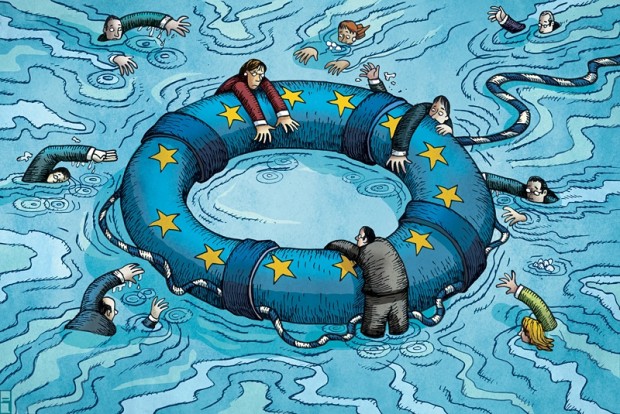Democracies without Accountability in the European Backyard
The end of communism was heralded as a critical ‘juncture’ for the global diffusion of democracy. Three decades since, the record of democratic gains defies initial expectations. To be sure, democracy has become the end goal of regime change across regions previously infamous for boosting political alternatives- former Soviet territories, Central and Eastern Europe, Balkans and more recently the Middle East. By now, political parties, governing actors and civic groups across various nations in transit advocate reform on the basis of democratic principles such ‘the will of the people’, ‘electoral competition’ and ‘electoral mandates’. Elections have increasingly emerged as the only legitimate method to screen political alternatives, select political representatives and delegate governing authority.
Still, the legitimacy of elections has proceeded at a faster pace than advances of democratization in general. The average democratic score in Central Europe, Balkans and Eurasia, where elections are deeply embedded as the only way to legitimize governing authority, has been on decline for 12 years in a row (Schenkkan, 2016). In Central and Eastern Europe, populist leaders that advocate xenophobic messages and disregard check and balances have now taken center stage. In the Eurasian segment of nations in transit, authoritarian leaders have moved to consolidate their grip on power while purging opposition, capturing state institutions and restricting mechanisms of social oversight. In the Balkans, individual leaders and parties have similarly resorted to control decision making process and use state institutions as a ‘political weapon’ to advance personal and/or party agendas (BTI, 2016a). Developments in the Middle East, where most recent openings of democratization have quickly rolled back or sunk into anarchy, provide a stark reminder of the difficulties and often failure of democracies to take hold (BTI, 2016b).

The gap between legitimacy of elections and progress of democracy concurs with the findings of a large body of comparative research on democratic transitions: elections are a necessary but merely sufficient dimension of regime change. Specifically, systematic periodical elections enable voters to scrutinize their representatives and chose the programs on offer once in every four years. Yet, the functioning and stability of democratic institutions in the period between elections depend on accountability mechanisms – horizontal and vertical – which serve to monitor elected authorities and prevent potential abuses of power during their term in office (Schedler, 1999). The growing tally of defective democracies shows that power holders’ reversal and disdain for accountability mechanisms, in particular, and institutional restraints, in general, is a widespread problem among new democracies. All across changing regimes strong ‘reformists’ tend to seek powerful electoral mandates and institute peace meal changes that increase their supremacy vis-à-vis oversight mechanisms –legislatures, representative local governments, the judiciary, the media, non-governmental organizations, and of course an active citizenry. The emerging democracies without accountability is a hybrid type of regime that typically rely on elections but features strong rulers, weak or façade institutions, prevailing informality, widespread corruption, personal or party control over decision making apparatus and often submission of check and balances to the will of majorities.
What is perhaps worrying regarding the persistence of democracies without accountability is their current trading at the very backyard of European Union and in the context of EU’s various democracy promotion strategies – enlargement in the Western Balkans and Turkey, EU neighborhood policy in post-Soviet sphere, and Foreign policy initiatives to deal with crisis in the Middle East. Even the prospect of accession, often held as EU’s most successful democracy promotion strategy, has seemingly failed to provide a significant anchor of reform across the Balkan region and Turkey, where reformist tend to talk the talk of European integration, but more often than not resist to walk the walk (Elbasani, 2013). Indeed, democratic scores of most EU candidates and potential candidates currently in the waiting room of enlargement are in decline since 2010 (BTI, 2016c). So, are the scores of EU-oriented post-Soviet republics, although this group is better off than the category of stagnant autocracies within the Russian sphere of influence (BTI, 2016a).
While the EU maintains its normative attractive power across the democratizing neighboring regions, the question remains how the EU policies can tackle the problem of elected powerholders who pledge commitment to the EU, on the one hand; and downplay domestic accountability mechanisms, on the other. Indeed, the EU democracy promotion strategies might need extensive revisions in order to take account and address the issue of flickering accountability. Given the emerging problem of democracies without accountability, any revisions of EU policies have to balance between different and sometimes competing targets – rewards to reformist power holders who use their mandates to institute change; and boosting of domestic accountability mechanisms that serve to monitor the political process and exercise of power in general.

The current focus of EU policy to embolden reformist elites via pressure of conditionality and related rewards has often proved a double edged sword for the advancement of democratization (Boerzel, and Risse, 2012). EU enforcement of reformist ‘constellations of power’ has proved necessary to neutralize veto players and to advance institutional reforms across democratizing polities in its vicinity (Schimmelfennig and Sedelmeier, 2006). Yet domestic elites or institutional change they undertake are rarely a safe bet for further democratization given that domestic actors frequently play out EU commitments and can make use of informal strategies of resistance, thus triggering a surface-thin and reversible pattern of institutional change (Ganev, 2007). Not surprisingly, EU promoted reforms have often degenerated into empty shells once the pressure of conditionality and rewards at stake ceased to exist. Moreover, the EU strategy of rewarding reformists have more often than not risked to embolden those politicians that show over-zealous formal compliance with EU criteria while resorting to informal resistance towards substantial reforms (Mendelski, 2015).
If elites’ compliance with the EU rules is a surface-thin indicator of reform to the extent that they frequently take back during implementation stages what they have commit to at the formal decision-making level, the challenge of democracy promotion depends on the mobilization of constituencies able to scrutinize elite behavior and inspect the evolution of EU rule transfers in the respective countries, hence domestic accountability. The EU is not oblivious to the role of oversight domestic mechanisms, be it organized civil society groups or constitutional mechanisms of check and balances. Indeed, the EU has often promoted the role of civil society and boosted independent institutions via technical and financial support, strategic prioritizing and periodical monitoring (Joireman, 2015). Yet, per EU policy, domestic constituencies that serve to hold elites accountable are often considered as at best auxiliary mechanisms of democratization and/or automatically autonomous, thus marring the de facto difference between politically autonomous and politically subservient structures. To summarize, the EU’s various democracy promotion strategies need to pay more attention to domestic mechanisms of accountability and screen their potential political links in order to address more effectively the rooting of defective democracies in its vicinity.
References
Boerzel, T. and Risse, T. (2012) ‘From Europeanization to Diffusion: Introduction’, Western European Politics 35(1): 1-19.
BTI (2016a) Post-Soviet EuroAsia. https://www.bti-project.org/en/reports/regional-reports/post-soviet-eurasia/
BTI (2016b) Middle East and North Africa. https://www.bti-project.org/en/reports/regional-reports/middle-east-and-north-africa/
BTI (2016c) East-Central and Southeast Europe. https://www.bti-project.org/en/reports/regional-reports/east-central-and-southeast-europe/
Elbasani, A. Ed. (2013) European Integration and Transformation in the Western Balkans: Europeanization or Business as Usual? Abingdon: Routledge
Ganev, V. I. (2007) Preying on the state: The transformation of Bulgaria after 1989, New York: Cornell University Press.
Joireman, S. F. (2015) ‘External conditionalities and institutional change: constructing constituencies for the rule of law in Kosovo’, Political Science Faculty Publications. Paper 121.
Mendelski, M. (2015) ‘The EU’s pathological power: the failure of external rule of law promotion in South Eastern Europe’, Southeastern Europe 39(3): 318–346.
Schedler, A. et. al (ed.) (1999) The Self-Restraining State: Power and Accountability in New Democracies. NY, Lynne Rienner Publishers.
Schenkkan, N (2016) Europe and Eurasia brace for impact. https://freedomhouse.org/report/nations-transit/nations-transit-2016
Schimmelfennig, F., and Sedelmeier, U. (2006) ‘Candidate countries and conditionality’, in P. Graziano and M.P. Vink (eds) Europeanization: New Research Agendas, Houndsmill: Palgrave, 88–101.

This article is published under a Creative Commons Attribution-NonCommercial 4.0 International licence.
